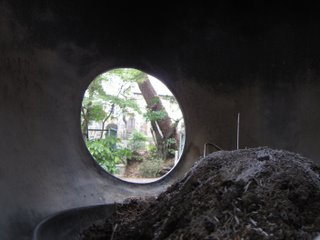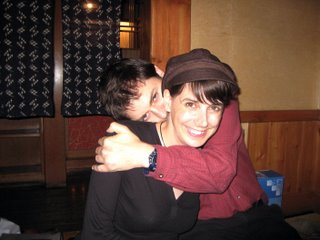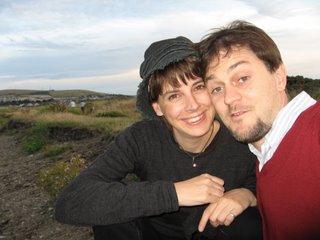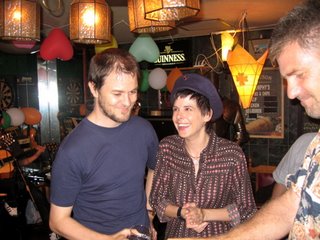
Reading In the Woods
The Writer's Group got together for a reading the day before Halloween. I decided I had better dress up for the occasion. It really was a perfect spot not far from Higashiyama Koen, but well hidden from the masses. My Halloween story is below, under the picture of my favourite Buddha. (PS; If anyone knows how to make italics or bold in the text here, please teach me! I need it quite a bit in the story below, especially for the foreign words. Any input would be appreciated.

Bargaining With Buddha
One of the things that sticks out in my memory the night the infestation took place was the weather. It was oppressively humid and sticky, one of those summer evenings in Japan that feels like someone took a sopping wet wool blanket too soon out of a hot dryer and spread it out evenly over the city. It's itchy, it's sticky, and the weight of the dampness is almost unbearable. Those kinds of conditions have a habit of bringing out the worst in people.
Wait, did I say worst? That sounds a bit like a judgment call, and since I'm talking about myself here I feel I had better be a little less harsh. To not give my own behaviour the benefit of the doubt would be unfair…wouldn't it?
So, perhaps what may be more appropriate would be to say is that it’s those kinds of weather conditions bring out the primitive in people. Gut reactions based on instinct, not experience. Spontaneous responses that hearken back to a time and place when such mechanisms were necessary. We've grown soft and complacent in our cushy computer worlds, never having to depend on the direction of the wind, or on the scent that it carries, to guide our actions. We need never worry about what may be lurking in wait just around the next boulder, or burrowed deep in heavy, dark earth, just itching to lunge on the next unsuspecting passerby.
So, I guess my reactions were primitive, primordial, impulsive. Did I deserve what I got? Maybe I did have it coming. Perhaps I did deserve it. But, did the punishment really fit the crime? I just don't know. What I do know, what I’m almost certain of, is that the incident came about because I had made a deal with Buddha. I'll never know if Buddha would have kept his end of the bargain because I reneged on our deal almost immediately.
I remember clearly the day I had walked the four hundred meters to my neighbourhood Temple. I was on a mission. I needed to talk to Buddha. Talking to my own God had yielded no results in a predicament that was slowly driving me mad. My life was being ruled by another force so invasive and persistent that I had been reduced to a twitchy, nervous wreck, jumping at the slightest movement caught from the corner of my eye. A shoelace, untied and dangling loosely from an unworn boot in a closet would send my heart racing and break beads of sweat on my upper lip. A harmless twig, stuck to the leg of my pants would be brushed away madly and frantically as others watched in curious amusement. My nerves were shot, and I knew my sanity was not far behind. At this point, you may well be wondering exactly what it was that was causing my irrational, knee jerk responses to benign objects. Allow me to help you see it in your mind’s eye.
To give you as clear an image as possible, you will need to hold up your two index fingers in front of you. Now, pull those two fingers apart in opposite directions, putting a distance of ten to twelve centimeters between them. There. You have the length. Now, imagine the thickness of one of those cheap plastic Bic pens, ballpoint. Can you see the roundness of it? That’s the width. The color? A deep, earthy brown, threatening to become black, with a hint of intense maroon thrown in for flash. Texture? To look at it, you would be certain, judging by the shimmer and shine, that to the touch it would moist, soft, sticky. You would be wrong. To touch it would yield a rubbery, scaled surface. The final addition? Onto the full length, add anywhere from one hundred to one thousand legs, each as fine as a strand of baby hair. There you have it. The bane of my existence; the Japanese centipede. The mukade.
Ah, mukade. When I moved into my home, I hadn’t realized, until comfortably settled in, that I was trespassing on centipede territory. In those innocent days, I didn’t even know that the Japanese word for centipede was mukade. The sound of the word, moo ka day, gave it a certain aura, like it came from one of those black and white Japanese monster films with characters named Mothra and Godzilla. The mukade had decided I was their nemesis, and, as in those old movies, there would have to be a Monster vs. Adversary situation. In the end though, who filled which role?
The mukade made me aware of their existence in a multitude of creative twists and turns. Brushing my teeth, about to spit frothy mint into the sink, I encountered the first one, coming up the drain to welcome me. I saw first its pincers feeling hesitantly at the circular, silver rim of the drain. As I watched in silence, I realized there was something alive in my once innocuous sink. I froze, mid-spit, not able to fathom what could possibly be attached to those two waving prongs peering out of the black hole below. The pincers felt around enough to realize there was no present danger, and its full body slithered into view. I couldn’t move. I could only stare in disbelief as its full form, ten centimeters, two pincers, and a thousand legs, glided smoothly from the drain hole and up onto the edge of the sink. The silence had to be broken. I screamed, not bothering to rid my mouth of Colgate foam, and ran out of the bathroom. Round 1 – Mukade.
Ordering pizza one late night, I waited in my bedroom on the second floor, reading Philip Roth’s latest. It was a dark little number called Patrimony, and it was setting the tone for a somber evening. I was laying stretched out on my bed, so fully engrossed in the sad and morbid tale unfolding in the pages in front of me that I hardly noticed the ring of the doorbell. When I finally clued in, the ringing had become impatient; short, sharp jabs on the doorbell by the Domino’s Pizza delivery boy waiting below. I grabbed the cash, and ran down the stairs.
On the second-to-last step, I stopped dead. There it was; bathroom mukade’s bigger, more menacing brother, laying in wait on the landing. As I stood in lurid limbo on the steps, Pizza boy was getting angrier and more insistent on doorbell duty. The short, sharp jabs became one long, steady buzz.
Just to the right of the landing was my boyfriend’s size 12 hiking boot. It was almost within my reach. I eyed the slinking mukade who seemed oblivious to its surroundings, and I took my chance. I leapt over the step, grabbed the boot, and opened the door, practically in one fluid action. The delivery boy did not fit the mold of my previous pizza pie couriers.
If you have ordered pizza in Japan, you may already be aware of a phenomenon that afflicts young delivery boys who find themselves on the other side of a foreigner’s door. When the door is opened to retrieve the goods and pay the price, the sight of a gaijin face sets off a series of predictable reactions. First, there is the startled gasp; that intake of air that indicates the boy was unprepared for such an unfamiliar sight. Then there is the slight back-step, a minute but discernable distancing from the unknown. This is followed by a few moments of silence as thoughts are collected, and the situation is analyzed. Usually, the voice is then found, offering both an “Excuse me” and an “I’m sorry” in quick succession… “Sumimasen, Gomen na sai”. And then more silence as the bill is paid, and the pizza passed over the threshold into the unknown land of foreigner.
On this particular night, the impatient delivery boy was most certainly not silent and did not follow the traditional pizza delivery pattern when the door was finally opened. The sight of a white girl with a size 12 boot waving in her right hand was too much for him. He yelped, dropped the pizza, and stumbled backwards at least three feet. I took that opportunity to turn around to face the centipede dancing on the first step and slammed the boot full force onto its squirming, rubbery form. I had to take a peek. I lifted the toe of the boot and looked underneath. It was still moving, trying to get away even though half its body had become one with the stair. Unbelievable. I slammed the boot down again, pizza boy witnessing the massacre in relative safety outside the front door. When I lifted my weapon this time, the splay of guts was a good indication the mukade was no more. I tried to ignore the fact that the bottom part of his body, now dismembered from its head, was still trying to get away.
I turned to face pizza boy. He was shaking, mouth open, pizza box still on the ground in front of him.
“Ikura desu-ka?” I said, asking him the price in my best Japanese. I straightened my shirt, patted down my hair and smiled in as friendly and non-threatening a way as possible, trying to regain his trust. He wasn’t having any of it. He kept the gulf of space between us, and didn’t take his eyes off of me as he reached down to pick up the dropped pizza box. After paying for the pie and closing the door behind the psychologically scarred Domino’s boy, I turned to inspect the remains of the mukade. Even though his lower half was still squirming and its multitude of legs were doing a final death dance waving madly in the air, I felt it wouldn’t be too premature to declare; Round 2 – me.
Although I had won the last round, the whole affair was getting to me. I said a nightly prayer, asking only that the centipedes not enter my space. My prayers went unanswered. I had daily encounters, finding centipedes of various lengths and widths, scattered throughout the house. No place was off limits; closets, drawers, and, the favourite meeting spot, the bathtub. I was losing the energy necessary to keep up with my unrelenting adversary. I started to contemplate moving to one of those small, cramped apartments, typical of large cities in Japan. True, apartments like that have no character or space, but, most important to me was that they also have no mukade. I started perusing the realty ads daily.
And then I realized something. I was praying to my God for a solution when I was dealing with Japanese centipedes. Rather than God, perhaps Buddha would have more of an understanding of my predicament. And, as luck would have it, Buddha lived right next door.
I made my way to the Temple, following the scent of incense up the gravel path to the gates. I washed my hands in the stone vessel, purifying myself before I made my request. I walked up the steps to the grated donation box and threw in my lucky gold five-yen coin. I clapped my hands, and faced the golden idol just beyond the doorway of the Temple itself. And then I made a bargain with Buddha. I looked up to the imposing gold figure in front of me.
“Buddha, if you keep the centipedes outside, I will leave them be.”
Short and sweet. I thought Buddha, in his Zen simplicity, would prefer that to a flowery, wordy request. I bowed deeply, turned, and followed the path back the few minutes to my house.
It worked. It really did. I didn’t see a centipede for ten days. Ten days of bliss. No waving pincers in the cereal box. No 100-legged dances across my kitchen floor. I could take a shower without first flushing a slithery invertebrate down the drain. I could go to bed without brushing down the sheets for unwelcome, multi-legged guests. It was heavenly.
But I ruined it. Day eleven, in the garden. I was pruning and clipping, pulling up weeds, preparing the wildly overgrown backyard for a barbecue. The humidity had made me cranky, and I was taking out my frustration on a particularly resilient weed. I stopped pulling on its leafy roots and started to dig into the damp earth around it with my fingers. The sting I felt was excruciating. I pulled my hand to my mouth, my instinct to suck on the wound. I looked closely at the tip of my finger. I was faced with two distinct holes, blood beginning to bubble up and spill over. I looked down at the weed I had been uprooting. The mukade was still there. It was the biggest yet, and, I am certain it was taunting me. Half its body was undulating, weaving in the air, reaching still for that finger it had just poisoned.
The rusted garden trowel I had been digging with was sitting on the ground just to my left. Gut instinct. Primitive fury. Primordial impulse. In a flash, the trowel was in my hand. It came down hard on the mukade, dissecting its body into two even pieces. The pincer portion of the body attempted flight, and started burrowing into the earth. My foot came down squarely on its head. I ground it into the earth with all my force. It didn’t stand a chance.
I stood up, throwing the trowel to the ground, and started tending to the throbbing wound at the end of finger. As I watched the tip change in colour from pink to red to a deep purple bulge, what I had done started to sink in. I had broken my deal with Buddha. I hadn’t kept my end of the bargain. I massacred that centipede on its own territory. What had I done?
I lay in bed that night, reading Nick Hornby. I needed something lighthearted to focus on as I tried in vain not to go over the details of the death in the garden. But I couldn’t stop thinking about it. I began to wonder if I should have had some ceremony for the centipede. Perhaps a cremation in the barbecue with a few prayers asking for forgiveness thrown in? I was contemplating firing up the backyard barbecue when the first one arrived. It announced its presence by slithering across the page of the book I was reading. I screamed and leapt out of bed, knocking the centipede off the book and into the sheets.
My barefeet hit the floor and felt immediately the rubbery, resilient body of another mukade. This one didn’t have a chance to bite. I didn’t pause to think or make a plan; I just ran. I was out of the bedroom and hit the stairs blindly, not watching where my feet were going. They knew the route and I merely followed. The bottom step was once again occupied. However, this time it was not by one but at least ten of them, sliding and crawling over one another in their attempt to get to the second step.
I had no time to think. I jumped over the slithering mass, and knew where I had to go. I grabbed a box of wooden matches off the kitchen table, and ran to the back doors to the yard. When I got to the doorway of the living room, I had to stop. The floor, made of traditional Japanese woven-straw tatami, was strewn completely with waving, sinewy mukade. Of all shapes, sizes and lengths, they tangled together in a jumbled, seething mass in front of the glass doors to the backyard. I had to shut down my senses and go on sheer instinct. I ran to the front door and grabbed those size 12 boots. They had served me well once before and I was relying on them to help me again. I put the huge boots on my feet, and made my way once again to the back door. I did my best to ignore the rolling, rubbery sensation under the thick soles as I trod over dozens of squirming mukade.
Finally outside, I went straight for the aluminum barbecue. I lifted the grates and struck the matches wildly, trying to light the bits of sticks and twisted paper still remaining from the last party. A small flame took, and I blew lightly on it, hoping it would be strong enough to catch. As the feeble flame grew stronger, I lit another match and used it as a guide to find the remains of my earlier kill. Five matches later, and I found both parts of its mangled body, half buried in the moist earth. I carried the head and the remaining part of the carcass carefully over to the barbecue, and, asking Buddha’s forgiveness, I threw the lot into the flames.
I watched as the body parts curled and crackled in the fire. As the smoke and flame licked higher and higher, I was soon overcome by a horrible stench that sat heavily in the humid air. I had never smelled anything like it, but could only imagine that the closest thing to compare it to would be burning flesh. I covered my nose and mouth with the sleeve of my pajama top, bitter tears welling in my eyes. I had to get out of there. As I tried to get around the barbecue, the lace of my oversized boot caught in the metal stand that held the flaming mess of paper, sticks and centipede. As I stumbled away, the whole thing tipped over completely, still hooked to my boot.
As the barbecue came crashing to the ground, glowing embers were flying everywhere; onto me, onto the grass, and onto the laundry hanging from the nylon line just by the back door. As the hanging underwear and socks started to catch with small sparks, I still felt I had a chance. I started pulling the smoldering laundry off the line, stamping on it, spewing so many bits and pieces of orange and yellow sparks all over the yard like a firecracker. And then I saw it. The kerosene can. What remained of last winter’s fuel stock was in a large, metal canister under the overhead laundry canopy. I also saw a sizable burning ember drop from a flaming sock right onto it. Whatever oil had splashed onto the can and ground around it, was now cloaked in a pale blue veil of flame.
Gut instinct. Primitive fury. Primordial impulse. I ran. I left the boots behind and bolted over the backyard fence and onto the street. It only took moments. The house was traditional, and it was old. That meant it was made of one thing only; wood. Flames took over the first floor, the smell of burning tatami and balsam filling the small street in a matter of minutes. Neighbours came to watch in awe, their faces glowing not only from the light of the fire but from the humidity that clung to their skin like adhesive.
In barefeet, I turned away from the scene, and walked up the street the short distance to the Temple. I needed to talk with Buddha. The sound of sirens filled the air as I made my way up the steps, tiptoeing delicately over the jagged gravel and over to the basin holding the purification water. I paused to wash my hands, taking a moment to splash some of the cool water on my face, washing away the slick sweat and gritty soot that had been clinging to me fiercely. I didn’t have a donation this time. The only thing I could offer was a deep bow of apology and regret. I looked into Buddha’s lair, but could see nothing. Was he there? Was he watching? I thought again of the importance of simplicity, and kept it at that.
“I’m sorry. Sumimasen. Gomen na sai.”
I turned and walked slowly back to what remained of my house. Firefighters filled the street, clomping up and down the road in their bright yellow gum boots, dragging water-logged hoses back to their engines. The rotating red lights on the top of each truck shone in wide arcs over the remaining stragglers, my neighbours. If they had been worried about me, I couldn’t tell. As I walked towards them, their faces betrayed no emotion. They only stared and took small, hesitant steps backwards as I walked past them, barefoot and silent.
Water was beginning to roll down the small road in my direction, criss-crossing in ever-widening rivulets. The cold water touched my feet and the coolness brought with it a certain sense of relief. I breathed in deeply. The stench was gone, replaced by the more comforting smell of burning leaves and a hint of incense. As I looked at the skeletal remains of my house, I had to smile. What else could I do? The mukade were gone.
***
The insurance people contacted me last week. They wanted me to go through what remained of my house. I knew there wasn’t much to see. I told them it wouldn’t be necessary, that there was nothing left to salvage. They said they had pulled a couple of items from the ruins and asked if they could send them on to my new address.
When I opened the box this morning, I could catch a whiff of woody smoke as I cut through the thick rubber tape on the cardboard box. Lifting the flaps up and open, I peered inside to find two small reminders of a bargain I had made not so long ago. A pair of size 12 boots with the laces slightly singed and tied in two neat bows were lined up symmetrically, nestled in the packing foam at the bottom of the box. Digging deeper into the Styrofoam bits, I could feel something hard, covered carefully in bubble wrap. Before I had completely unwrapped it, I knew what it was by the shape and the feel. The garden trowel.
My hands are gritty with soil as I write this. My new garden is smaller than my last, a little less wild, and a little more in keeping with its environment. I even have a mini carp pool and a bonsai tree in the corner that offer that little bit of Zen I used to try and absorb at my former neigbouring Temple. The place of honour, though, is in the centre on a small, cement slab. A Buddha figurine watches serenely over two large boots and a rusty garden trowel. His gaze is calm, wise, all-knowing. I look around at my new house, my new garden, and the battle-weary size 12 boots, and my instinct tells me only one thing. I am home.









